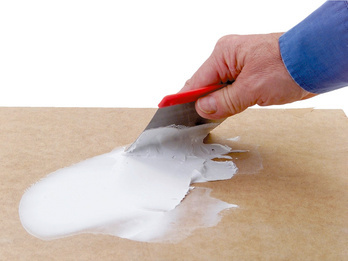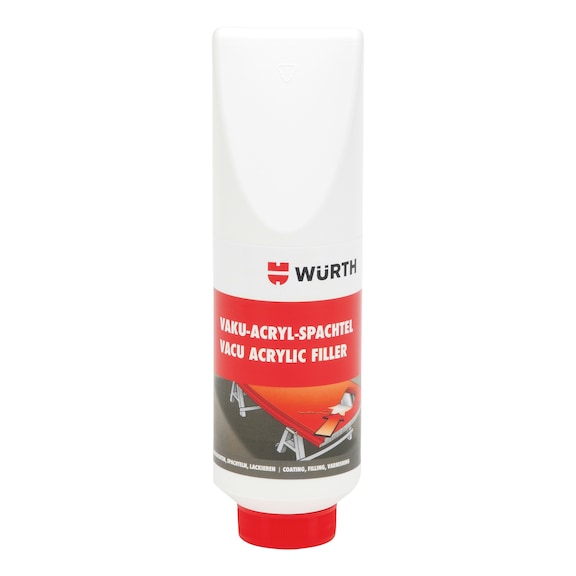For detailed information, other images and documents, please select individual articles from the following table.
VAKU acrylic filler
Ready-to-use, 1-component water-based filler
Register now and access more than 125,000 products

Variants
Ready to apply
- Fast and easy to apply
- Saves time
- No hardener required
Can be painted and sanded
The filler can be painted with a multitude of paints and varnishes.
Good adhesion and load-bearing capacity
Environmentally friendly
- Solvent-free
- Low emissions
- Practically odourless
For indoor use only. When sanding, you should wear a fine-dust mask. Store VAKU acrylic filler in a cool, but frost-free place. Do not expose to direct sunlight. Unopened, it can be stored for 1 year.

| Ready-to-use, single-component water-based filler. | ||||
| Item | Substrate | Preparatory work before filling | Pre-treatment | Intermediate and final treatment |
| 1. | Carpentry Wood Metal | Substrate must be dry and free from dust, grease and loose particles. Pay attention to the risk of discolouration/seeping through from nicotine, rust etc. Insulating priming is recommended here. | Untreated wood and metal should be treated with a primer. We recommend that you prime very absorbent surfaces In order to absorb uneven surface absorption. | After sanding work, we recommend intermediate treatment with the appropriate base colour before applying the final coats. Can be treated with almost all paints and varnishes available from retailers. |
| 2. | Gypsum panels and chipboard | See item 1. | See item 1. | See item 1. |
| 3. | Gypsum joints | Not recommended. The material is not suitable for this area. | ||
| 4. | Wallpaper and fabrics | See item 1. | See item 1. | See item 1. |
| 5. | Damp rooms | Not recommended. The material is not suitable for this area. | ||
| 6. | Concrete Gas concrete Sand-lime brick Indoor plastering | Not recommended. The material is not suitable for this area. | ||
| 7 | The details in this product information have been compiled to the best of our knowledge and conform to our latest application methods. However, they can and should only be regarded as conditional advice, since the different surface properties, working methods and applications are outside of our control. Attention must be paid to any special cases arising from conditions on site. | |||
The usage instructions are recommendations based on the tests we have conducted and our experience; carry out your own tests before each application. Due to the large number of applications and storage and processing conditions, we do not assume any liability for a specific application result. Insofar as our free customer service provides technical information or acts as an advisory service, no responsibility is assumed by this service except where the advice or information given falls within the scope of our specified, contractually agreed service or the advisor was acting deliberately. We guarantee consistent quality of our products. We reserve the right to make technical changes and further develop products.
Filling and surface filling, e.g. on door leaves, wooden beams, door and window frames and similar items made from wood and steel.
VAKU acrylic filler is applied with a steel spatula at temperatures no lower than +5°C. The surface must be clean, load-bearing and dry. Maximum coat thickness approx. 2 mm. Absorbent surfaces, steel surfaces and untreated wooden surfaces must be primed first. Wear a fine-dust mask when sanding. Thoroughly remove all dust from sanded surfaces before applying wallpaper or paint.
Select RAL-colour code
!! NOTE: On-screen visualisation of the colour differs from real colour shade!!







